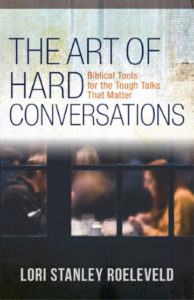How Can You Call Yourself a Christian and Believe That?
 Christians are free to disagree.
Christians are free to disagree.
We’ve forgotten that.
The church was born on a battlefield. Ultimately, the victory is ours but there are still battles to fight until we Jesus comes again.
One, is the battle for one another. Not WITH one another, but FOR one another. In Jesus, we were reconciled to our Father God, and we became adopted into a family that consists of people from every tribe, tongue, nation, and walk of life.
We were adopted into different!
He unified us and our calling is to maintain that unity—not uniformity, but unity. Like any family, we have varying perspectives but still sit around our Father’s table and share a meal.
There will be important, life-changing issues on which Christians may not see eye-to-eye.
It’s everywhere right now. The questions about what Christians should believe on all kinds of political and societal matters, for example:
- Is it more Christian to agree that college debts should be forgiven or more Christian to believe that puts an undue burden on others?
- Is it more Christian to vote Democrat or Republican?
- Is it more Christian to attend a gay wedding or to affirm your love but not attend?
- Is it more Christian to vote for choice around reproductive rights or to legally restrict abortions?
- Is it more Christian to create a refuge for people who enter our country without permission or to support enforcement of border laws or to do both?
These are not small questions and they’re becoming lines threatening to divide us from one another. We don’t have to buy the divide.
Of course, it’s unsettling when we determine an opinion on a situation based on our understanding of God and His Word only to learn that other believers have studied the same Bible but formed an opposite opinion. Unsettling, threatening, scary, concerning, cause for some alarm—absolutely, I resonate with those feelings.
But justification for name-calling, condemnation, public shaming, or raising suspicion about someone’s salvation? Proceed with extreme caution.
There are false teachers at large. There are wolves among sheep. There are people who say they’re Christians who aren’t. This is true. The apostles lived during a time when Christians were persecuted, arrested, imprisoned, and sometimes killed, and yet the threat they felt the need to warn most about in their letters was false teaching. It is a serious issue in our times and when we encounter false teachers, false teaching, or heresy, we are right to speak the truth in love.
Be proactive. Support sound teaching. Promote sound teaching. Sit under sound teaching. But, remember Chicken Little. The sky of our faith isn’t falling because others have different opinions than we do.
What are some ways to wisely navigate differences with an eye to maintaining the unity of the Body of Christ without compromising truth?
- First, Jesus walked this world in love and truth. So, can we. Believe this, promote this, and pray for help with your unbelief. Jesus laid down His life for the church. Pray for that kind of love.
- Second, know what you believe and why you believe it. What is the biblical basis for your opinion? It’s good to dig into God’s Word and apply it to life in this world. That doesn’t always happen in a single Google search. It can take significant reading, study, thought, discussion, and prayer.
- Third, know what are essential truths of the faith on which you cannot, must not, compromise. Like Jesus. There is only one way to the Father and that is through His Son, Jesus.
- Fourth, be wise and speak with love-infused, humble, wisdom. When others of the faith disagree, reaffirm that you share agreement around the essentials of the faith. Reaffirm your love. Double-down on love and commitment to those brothers and sisters. Speak your understanding of the truth without apology but with gentleness, always with a listening heart. Ask a lot of questions. Seek to understand more than to be understood. Disagree without being disagreeable.
- Fifth, remind everyone that from the beginning of the church, reasonable Christians have formed different opinions they all believed were based on biblical truths, and yet, maintained unity in Christ. Christ has set us free. Free to love others with whom we disagree. Free to believe something different than another. Sometimes we do need to walk away or separate but invest effort first. Do the work.
- Sixth, pray for those with whom you disagree with fervency. Invest more time in prayer for their hearts and minds than on social media with scolding and shame. Pray, fast, study their opinions to learn how they think so you can better explain the truth, then pray more, listen more, talk more.
- Seventh, consider others better than yourself. See the truth, not as your weapon, but as the light that helps you find your way in love to them. Do the work family does for one another to stay together against all odds for Jesus’ name and be wise toward “outsiders.” Colossians 4:5-6.
 Don’t buy the divide.
Don’t buy the divide.
When critics point out to you that Christians “can’t even agree” reject shame and condemnation. That’s the trap. Instead agree. Yes, we certainly have more work to do as a family! I’d love to hear more about how this affects you, to hear Christians disagree! It will motivate me as I interact with other Christians.
Remain calm. Say something like this and invite the Holy Spirit in.
“Yes, I know what you mean. We certainly are a varied bunch that God has called together! You can see that Jesus isn’t afraid of a challenge! He’s so confident in His power to transform us that He is willing to save anyone who comes to Him, even knowing they’ll bring different opinions into His family. I love that you’re really paying attention to the church. I think that’s God calling to your heart. I’m happy to talk about the differences you’re observing. Which ones impact you the most? How can I help?”
Disagreement happens. The enemy will jump on it to tempt us all to fear one another or to lose heart.
Resist the devil and he will flee. Draw near to God. And to one another. Because of Jesus, we have nothing to fear—not even our own disagreements.
**Sometimes you write a book because there are things you want to say. I wrote this book with Saundra because there were things I DIDN’T want to say, but knew God wanted me to say (and hear). Join us. Order your copy today and find out what we’re all NOT saying.
When Christians disagree – https://t.co/uLpHCBWYtx Reject shame and scolding, embrace what is true. #amwriting #Jesus
— Lori Roeleveld (@lorisroeleveld) September 6, 2022












The Conversation
Lori,
There is MUCH TRUTH
and a couple of typographical errors
In this EXCELLENT POST!
Love, Mark & Karen
One of your all-time Best Blogs! Thank you.
Yesterday college students told me they think Christians are politically on the right, with the Republican party. They were surprised to learn of Christians who lean politically left. I’m concerned that Christians are identified with one political party – our identity should be in Christ alone. I agree – the enemy is exploiting this divided. We need to unite, to be salt and light to both political parties, in all situations. Thank you, Lori, for this list of ways to pray!
Thank you being a clarifying voice during times of division. I especially like the way you encourage us to “own” our disagreements. Well put!
My heart hurts because of the anger and rejection the world is seeing within our body of believers. Unfortunately, I’ve learned to refrain from voicing some of my opinions because I know how some of my Christian brothers and sisters will react. I pray every day for Jesus’s peace to flood His people.